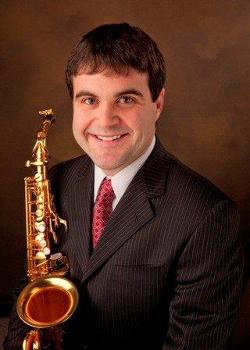Saxophone professor obsessed

Courtesy Photo / gvsu.edu Jonathan Nichol, saxophone, will perform in the Cook-DeWitt Center on Thursday
Nov 18, 2010
When Grand Valley State University saxophone professor Jonathan Nichol completed his doctoral degree of musical arts at Michigan State University in May 2010, he found himself with an unusual amount of free time.
Nichol needed to find a hobby to replace the long, studious nights and twice-weekly trips between Allendale and East Lansing. So he bought a road bike, a Specialized Roubaix, because after 10 years of university-level training in classical saxophone, he wanted to focus on something other than music, if only for a few months.
He pedaled an average of 40 miles per trip. He rode six days each week, and by the end of the summer he logged 1,700 miles on his Roubaix. Nichol describes this behavior as “assimilation” – the act of absorbing as much knowledge as possible about an object – in this case, a sport that was new to him.
At the start of the fall semester, the 28-year-old professor shifted his focus back to absorbing knowledge of music and the woodwind instrument he has played since he was 8 years old.
Nichol will display his saxophone skill at an Artist-Faculty Series concert today at the Cook-DeWitt Center at 8 p.m.
Michelle Kozachik, a senior saxophone major who has studied under Nichol for three years, expects a diverse arrangement from the performance, which is scheduled to run until 10 p.m.
“Dr. Nichol brings a lot of variety to the music, making sure that there are pieces that are attainable to the ear, and then also something that will challenge you with the emotion behind it,” Kozachik said.
Nichol said his father, John, a saxophone professor at Central Michigan University, guided him and gave him a good foundation that afforded him success as a performing artist.
“When I was starting to play saxophone, my dad bought me a CD called ‘Duke Ellington’s 16 Most Requested Songs,’ and we went home and listened to the whole thing, and I heard alto saxophone with (jazz musician) Johnny Hodges for the first time,” he said. “It’s like sometimes in your life you have ‘Ah Ha’ moments. I heard this song and the instrument, and I said, ‘I want to do that.’ All my degrees are in classical saxophone, but I remain an active jazz musician.”
GVSU professor Geoff Deibel performs with Nichol in the award-winning four-piece saxophone ensemble, h2 Quartet, and said it is uncommon for a saxophonist to show such skill in the two genres.
“He’s very talented in jazz and classical saxophone, which is rare,” Deibel said. “Usually you’re good at one or the other, but not both.”
Nichol’s ability also elicits praise from senior saxophone major Roger Wagner, who has taken a Nichol-taught class in each of his four years at GVSU.
“He is virtuosic,” Wagner said. “When he plays in a lesson or in the studio, you fall in love with his tone because it’s just rich and warm, and he can do whatever he wants with it. He’s incredibly sensitive to how to make sounds on the horn.”
Nichol studied saxophone under his father at Central Michigan where he earned his bachelor’s degree in music education. Two years later, he earned his master’s degree in music from Michigan State.
While his formal training at the universities focused on classical saxophone, Nichol’s passion for jazz emerged from performing in the Nichol Trio with his father and brother, Jason, and from listening to Duke Ellington … a lot … as in he owns every Ellington album ever recorded in North America.
A self-professed “Ellingtonian,” Nichol began collecting the 20th century jazz albums as an early teen because he found the music to be “complex, honest, melodic and beyond category.”
“There was a point where I could listen and be able to tell you the recording date and personnel involved with the songs, but a doctorate kind of got in the way of that,” Nichol said.
Some might say that Nichol’s passion for Ellington’s music reflects an obsession. He said he prefers to think of it as assimilation.






















